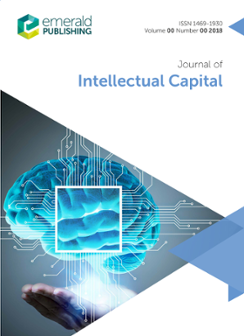Intellectual capital between measurement and reporting: a structured literature review
IF 6.8
2区 管理学
Q1 BUSINESS
引用次数: 6
Abstract
PurposeIn the past decade, intellectual capital (IC) measurement and reporting have been feeding scientific debate; however, only few studies address these issues together. The present research aims to provide an integrated view of the topics covered by the existing literature and to highlight the emerging research trends and set the agenda for future research.Design/methodology/approachThis study develops a structured literature review (SLR) of the extant research concerned with IC measurement and reporting, using a comprehensive sample of 1,021 articles extracted from the Scopus database.FindingsThe findings of the SLR show that the existing literature focuses on seven research areas: IC and public sector; IC university and education; IC evaluation method; internal and external IC disclosure; IC and CSR; management of IC in organizations; other. Overall, findings indicate that IC measurement and reporting are highly researched topics that continue to attract the interests of scholars. Finally, the SLR analysis has allowed outlining a future research agenda, with particular reference to the IC evaluation method and internal and external IC disclosure research areas.Research limitations/implicationsThe main limitation of this research lies in the manual screening of relevant studies, which entails some degree of subjectivity. Furthermore, another limitation research could be considered the use of a single database (Scopus).Originality/valueThe present study brings potential contributions for scholars and practitioners. From a scholarly perspective, the paper provides a systematization of scientific contributions that have dealt with IC measurement and reporting. In particular, it contributes to the scholarly debate bringing into focus various IC measurement and reporting issues in the landscape of private and public organizations. Referring to practical implications, our research supports the strategic use of IC measurement and reporting as a key lever for improving the management of firms. Using an analytical framework that combines insights from the agency, stakeholder and legitimacy theories, this study highlights that IC reporting activity should be used strategically as a means to engage with all firm's stakeholders, in particular with a view to reducing information asymmetry and improving firm reputation.测量和报告之间的智力资本:一个结构化的文献回顾
在过去的十年中,智力资本(IC)的测量和报告一直在引发科学辩论;然而,只有少数研究将这些问题放在一起。本研究旨在对现有文献所涵盖的主题提供一个综合的观点,并强调新兴的研究趋势,并为未来的研究设定议程。设计/方法/方法本研究对现有的IC测量和报告研究进行了结构化文献综述(SLR),使用了从Scopus数据库中提取的1,021篇文章的综合样本。研究结果单反研究结果表明,现有文献主要集中在七个研究领域:IC和公共部门;IC大学与教育;集成电路评价方法;内部和外部IC披露;集成电路和CSR;组织内部集成电路的管理;其他。总体而言,研究结果表明,IC测量和报告是高度研究的主题,继续吸引学者的兴趣。最后,SLR分析可以概述未来的研究议程,特别是参考IC评估方法和内部和外部IC披露研究领域。研究局限/启示本研究的主要局限在于对相关研究的人工筛选,存在一定的主观性。此外,另一个限制研究可以考虑使用单一数据库(Scopus)。原创性/价值本研究为学者和实践者带来潜在的贡献。从学术的角度来看,本文提供了一个系统的科学贡献,已处理IC测量和报告。特别是,它有助于学术辩论,将焦点放在私营和公共组织领域的各种IC测量和报告问题上。就实际意义而言,我们的研究支持将集成电路测量和报告作为改进公司管理的关键杠杆的战略使用。本研究使用了一个结合了代理、利益相关者和合法性理论见解的分析框架,强调企业内部报告活动应战略性地用作与所有公司利益相关者接触的手段,特别是为了减少信息不对称和提高公司声誉。
本文章由计算机程序翻译,如有差异,请以英文原文为准。
求助全文
约1分钟内获得全文
求助全文
来源期刊

Journal of Intellectual Capital
Multiple-
CiteScore
14.50
自引率
13.30%
发文量
27
期刊介绍:
The Journal of Intellectual Capital is a peer-reviewed international publication dedicated to the exchange of the latest research and best practice information on all aspects of creating, identifying, managing and measuring intellectual capital in organisations. The journal publishes original research and case studies by academic, business and public sector contributors on intellectual capital strategies, approaches, frameworks, tools, techniques and technologies in order to increase the understanding of intellectual capital within the context of the modern knowledge economy. The focus of this journal is on the identification of innovative intellectual capital strategies and the application of theoretical concepts to real-world situations.
 求助内容:
求助内容: 应助结果提醒方式:
应助结果提醒方式:


